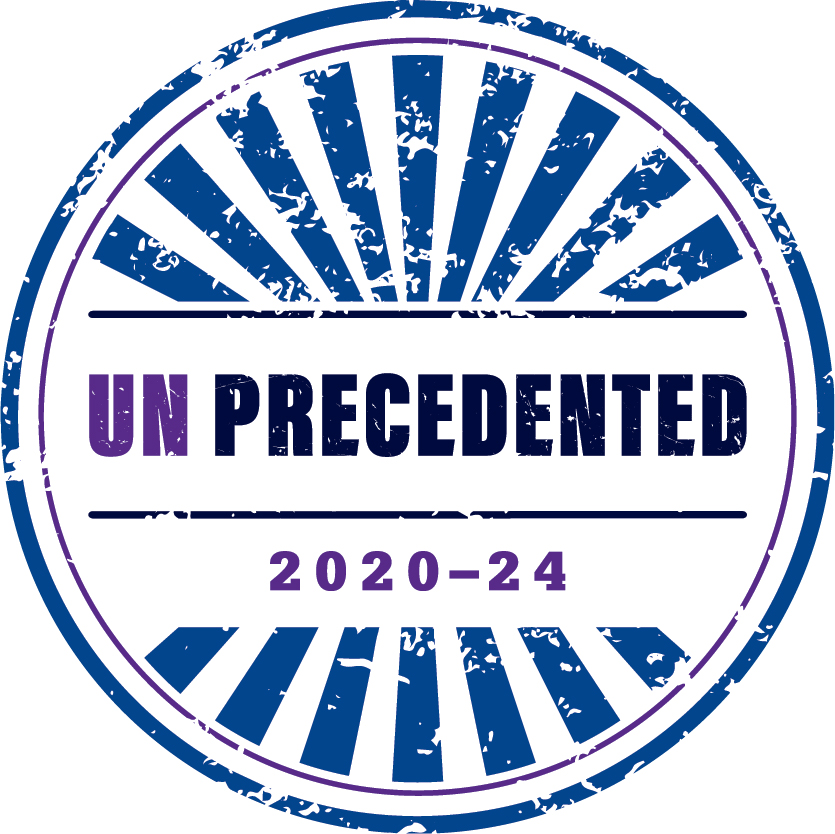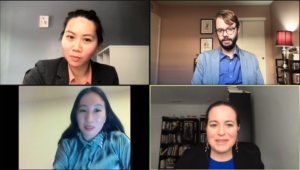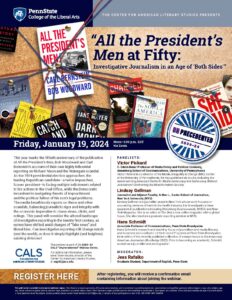CALS “Unprecedented” Webinar Series Still Keeps Up with the Times

When CALS director Sean Goudie introduced the “Unprecedented” series in 2020, he was forced in some ways to improvise. With the COVID-19 pandemic putting a halt to the Center’s typical in-person programming, Goudie combined a relatively novel format—the Zoom webinar—with a tried-and-true organizational structure: a planning committee composed of Goudie, the CALS undergraduate intern, and a select few “top Americanist graduate students.”
Says Goudie, “The make-up of the organizing committee for the webinar series was initially a product of its ‘accidental’ creation and since then is a result of the ongoing brilliant contributions of the various graduate students and undergraduate students who have been part of the ‘UP’ organizing team each year.” This committee is tasked annually with proposing the year’s slate of webinars and identifying speakers, typically experts in their respective fields, to serve on each panel; they also produce copy and design instructions for all advertising materials and are invited to moderate their own webinar.

Eunice Toh, the 2020-2021 CALS graduate research assistant who helped Goudie develop and execute the first year of “Unprecedented” programming, found it to be “a great experience.” Toh hosted a webinar on “Politics, Performance, and Pseudoscience” which brought together scholars from the U.S. and U.K. to discuss the role of science communication on individual medical (and political) decision-making.
“I was extremely nervous,” recalls Toh, “but the academics on my panel were pros and made my job so much easier.” Afterward, she was pleased to discover the webinar’s reach and impact: “We had emails from people working in medical humanities or medicine-related fields thanking us for the webinar and saying they wanted to show this recording to their class.”
The webinar series’ moniker was initially inspired by the media’s tendency, in the early days of the pandemic, to refer to each new development as “unprecedented.” That term, which Goudie calls “overused and abused,” has proved quite adaptable and durable post-pandemic. As Goudie notes, “There will always be ‘late-breaking’ developments in matters related to the study of American literature, culture, and society that might be understood as ‘unprecedented.’”

To that end, the first webinar of the current 2023-2024 “Unprecedented” series focused on “AI and the Labor(s) of Writing” and was a direct response to current debates in academia and the arts around the use of artificial intelligence programs like ChatGPT and DALL-E to produce written and visual content. Panel moderator Morgan Hamill, a second-year PhD student in English at Penn State, was inspired by the panelists’ remarks to consider whether “a piece of what makes AI so threatening to artists and writers is the idea that it reveals how much of our creativity is simply associative: we take a bunch of stuff that we know, stick it together in new combinations and formations, and that's creativity.”
Hamill was also struck by panelist Annette Vee’s observation that “AI can create, but it isn't responsible for what it makes [and] can't be held accountable for the things that it supposedly says and does, the way you might hold an artist or writer accountable for their work.”

Writerly accountability is in part the focus of the second “Unprecedented” webinar of the season, which will use the upcoming fiftieth anniversary of Bob Woodward and Carl Bernstein’s groundbreaking political exposé All the President’s Men to consider “Investigative Journalism in an Age of ‘Both Sides’” and discuss how journalists balance market demands with professional ethics and integrity. The final two webinars of the season will continue with these themes of labor and its value, with February’s event focusing on Black women writers and artists in the academy, and April’s on American working-class art and literature.
Carmin Wong, a first-year PhD student in English and African American and Diasporic Studies, will be moderating this third webinar, “Of The Spirit: Black Women Writers On The Authenticity of Wellness.” In developing this panel, Wong's goal was to counter the disciplinary tendency in American literary studies that “center[s] white writers and their ideologies while inferiorizing Black writers and their literatures” and “to transgress boundaries that exclude Black intellectual production.”
Wong adds, “I knew immediately that if we get Black women together to discuss our experiences, by nature, we would transform any space, and what excites me most is that I get to do that with folks who have trained me in this practice of radical vulnerability and community care.”
As Wong suggests, moderating an “Unprecedented” webinar can be a meaningful experience. Each of this year’s panels (as was also the case with the 2022-2023 season) will be moderated by a current Penn State graduate student, whether a member of the “Unprecedented” planning committee or not. As the series continues to produce well-received and wide-reaching programming, it will also continue to provide, in Toh’s words, “these opportunities to network and moderate” for graduate students.
Goudie promises as much: “Top Americanist graduate students remain vital parts of the organizing committee,” he says. “Penn State is one of the most outstanding institutions in the country for graduate students to study American literature and culture. Thus, it makes sense to draw on the brilliant ideas, energy, and expertise of our top Americanist graduate students to devise and implement the series each year, and I think the efficacy of that strategy is borne out by the tremendous success of the series in its inaugural year and ever since.”

When CALS director Sean Goudie introduced the “Unprecedented” series in 2020, he was forced in some ways to improvise. With the COVID-19 pandemic putting a halt to the Center’s typical in-person programming, Goudie combined a relatively novel format—the Zoom webinar—with a tried-and-true organizational structure: a planning committee composed of Goudie, the CALS undergraduate intern, and a select few “top Americanist graduate students.”
Says Goudie, “The make-up of the organizing committee for the webinar series was initially a product of its ‘accidental’ creation and since then is a result of the ongoing brilliant contributions of the various graduate students and undergraduate students who have been part of the ‘UP’ organizing team each year.” This committee is tasked annually with proposing the year’s slate of webinars and identifying speakers, typically experts in their respective fields, to serve on each panel; they also produce copy and design instructions for all advertising materials and are invited to moderate their own webinar.

Eunice Toh, the 2020-2021 CALS graduate research assistant who helped Goudie develop and execute the first year of “Unprecedented” programming, found it to be “a great experience.” Toh hosted a webinar on “Politics, Performance, and Pseudoscience” which brought together scholars from the U.S. and U.K. to discuss the role of science communication on individual medical (and political) decision-making.
“I was extremely nervous,” recalls Toh, “but the academics on my panel were pros and made my job so much easier.” Afterward, she was pleased to discover the webinar’s reach and impact: “We had emails from people working in medical humanities or medicine-related fields thanking us for the webinar and saying they wanted to show this recording to their class.”
The webinar series’ moniker was initially inspired by the media’s tendency, in the early days of the pandemic, to refer to each new development as “unprecedented.” That term, which Goudie calls “overused and abused,” has proved quite adaptable and durable post-pandemic. As Goudie notes, “There will always be ‘late-breaking’ developments in matters related to the study of American literature, culture, and society that might be understood as ‘unprecedented.’”

To that end, the first webinar of the current 2023-2024 “Unprecedented” series focused on “AI and the Labor(s) of Writing” and was a direct response to current debates in academia and the arts around the use of artificial intelligence programs like ChatGPT and DALL-E to produce written and visual content. Panel moderator Morgan Hamill, a second-year PhD student in English at Penn State, was inspired by the panelists’ remarks to consider whether “a piece of what makes AI so threatening to artists and writers is the idea that it reveals how much of our creativity is simply associative: we take a bunch of stuff that we know, stick it together in new combinations and formations, and that's creativity.”
Hamill was also struck by panelist Annette Vee’s observation that “AI can create, but it isn't responsible for what it makes [and] can't be held accountable for the things that it supposedly says and does, the way you might hold an artist or writer accountable for their work.”

Writerly accountability is in part the focus of the second “Unprecedented” webinar of the season, which will use the upcoming fiftieth anniversary of Bob Woodward and Carl Bernstein’s groundbreaking political exposé All the President’s Men to consider “Investigative Journalism in an Age of ‘Both Sides’” and discuss how journalists balance market demands with professional ethics and integrity. The final two webinars of the season will continue with these themes of labor and its value, with February’s event focusing on Black women writers and artists in the academy, and April’s on American working-class art and literature.
Carmin Wong, a first-year PhD student in English and African American and Diasporic Studies, will be moderating this third webinar, “Of The Spirit: Black Women Writers On The Authenticity of Wellness.” In developing this panel, Wong's goal was to counter the disciplinary tendency in American literary studies that “center[s] white writers and their ideologies while inferiorizing Black writers and their literatures” and “to transgress boundaries that exclude Black intellectual production.”
Wong adds, “I knew immediately that if we get Black women together to discuss our experiences, by nature, we would transform any space, and what excites me most is that I get to do that with folks who have trained me in this practice of radical vulnerability and community care.”
As Wong suggests, moderating an “Unprecedented” webinar can be a meaningful experience. Each of this year’s panels (as was also the case with the 2022-2023 season) will be moderated by a current Penn State graduate student, whether a member of the “Unprecedented” planning committee or not. As the series continues to produce well-received and wide-reaching programming, it will also continue to provide, in Toh’s words, “these opportunities to network and moderate” for graduate students.
Goudie promises as much: “Top Americanist graduate students remain vital parts of the organizing committee,” he says. “Penn State is one of the most outstanding institutions in the country for graduate students to study American literature and culture. Thus, it makes sense to draw on the brilliant ideas, energy, and expertise of our top Americanist graduate students to devise and implement the series each year, and I think the efficacy of that strategy is borne out by the tremendous success of the series in its inaugural year and ever since.”